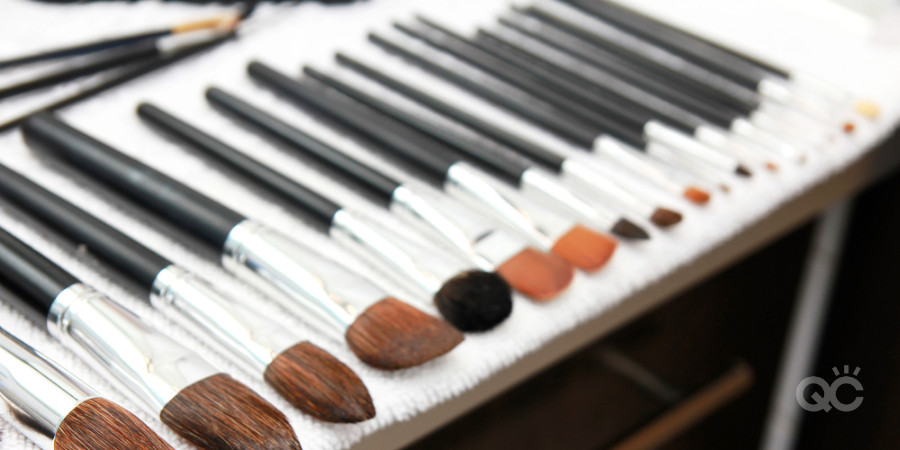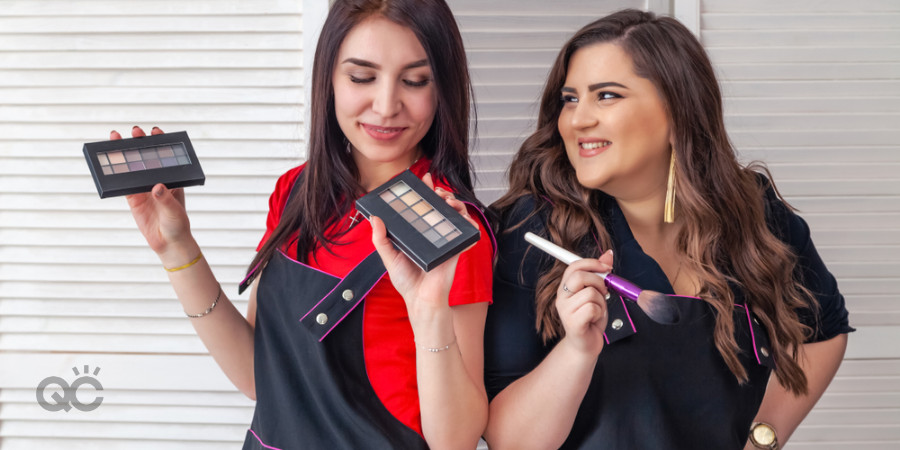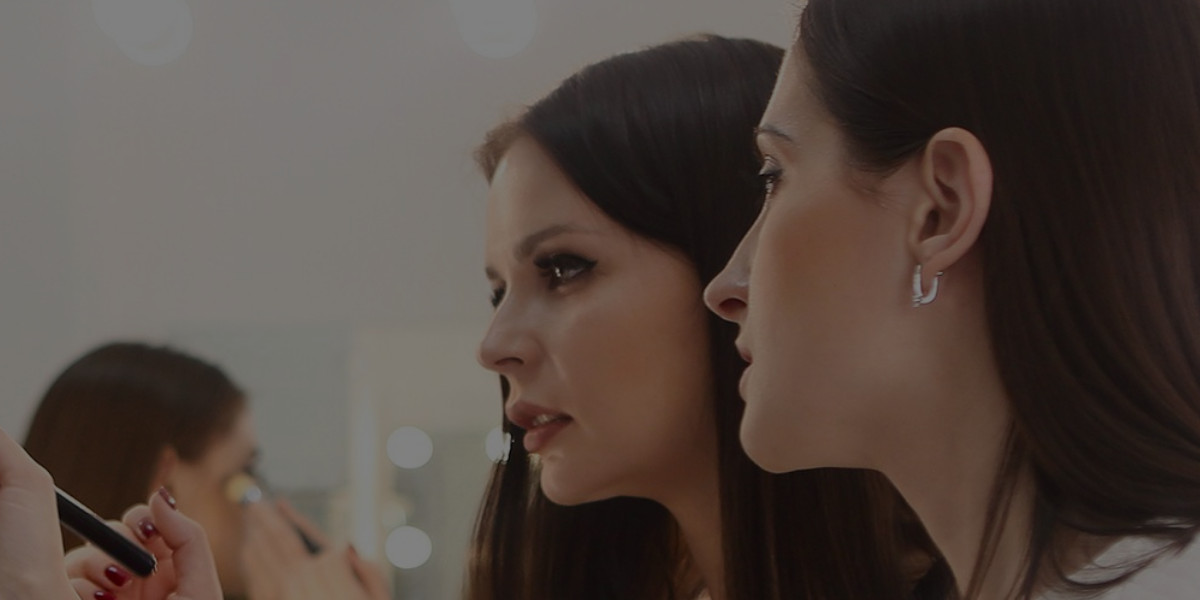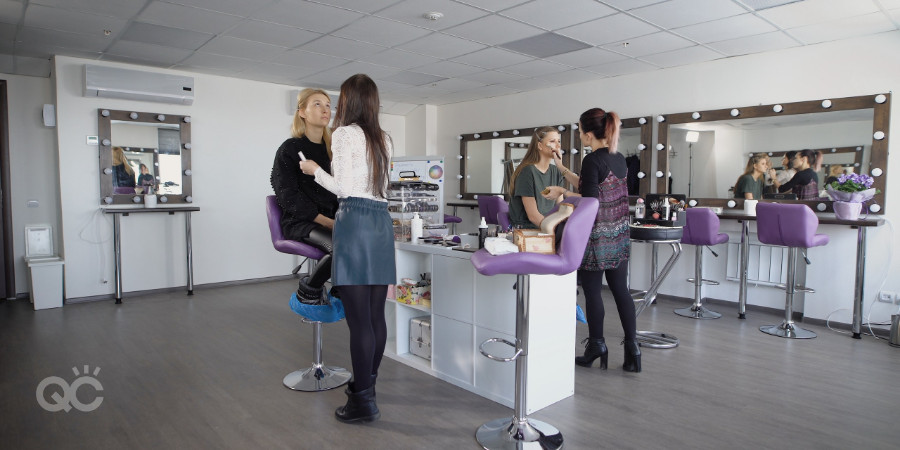The life of a freelance makeup artist doesn’t start out glamorous. You’ll need to make a name for yourself and connect with industry pros. The difficult part is discovering the best path for you. Every aspiring makeup artist has their own path to success. No matter the path, one thing’s for sure: you need to start by gaining experience. Becoming an assistant makeup artist is one way to gain experience while getting acquainted with the variety of makeup artist jobs out there. You’ll be able to see the jobs you actually like and want to pursue in the future.
So, are you cut out to be an assistant?
 As an assistant makeup artist, you might have to…
As an assistant makeup artist, you might have to…
 Your job is to do whatever the key makeup artist needs you to do—whether that’s applying a full face of makeup yourself or running out to buy an extension cord. You can’t always count on being able to do makeup at any particular job.
But the experience you get out of your work is invaluable. You’ll get an inside look at a day in the life of an artist. Harness this experience and you can easily find yourself working next to many big-name makeup artists sooner than you think. While you won’t spend all your time applying makeup, you will get an up-close look at how the pros work. You’ll learn their tricks of the trade—and you’ll get to see how they deal with conflicts and last-minute problems during at a makeup job.
Your job is to do whatever the key makeup artist needs you to do—whether that’s applying a full face of makeup yourself or running out to buy an extension cord. You can’t always count on being able to do makeup at any particular job.
But the experience you get out of your work is invaluable. You’ll get an inside look at a day in the life of an artist. Harness this experience and you can easily find yourself working next to many big-name makeup artists sooner than you think. While you won’t spend all your time applying makeup, you will get an up-close look at how the pros work. You’ll learn their tricks of the trade—and you’ll get to see how they deal with conflicts and last-minute problems during at a makeup job.
 Yes, we know grabbing the key artist a cup of coffee isn’t a task that’ll be highlighted on your makeup resume—but if it has to be done, then it has to be done. Remember: that key artist was once an assistant makeup artist themselves, doing exactly the job you’re doing now. If they stuck it out, so can you!
Yes, we know grabbing the key artist a cup of coffee isn’t a task that’ll be highlighted on your makeup resume—but if it has to be done, then it has to be done. Remember: that key artist was once an assistant makeup artist themselves, doing exactly the job you’re doing now. If they stuck it out, so can you!
 As an assistant makeup artist, your number-one priority is the key artist. You’re not there for the client, director, or photographer—you’re there to make sure the key artist has what they need. Sometimes you may end up working with other people on the set or behind the scenes, but keep your focus in mind. That means going to the key artists with any questions about the job, too—going right to the client, director, or photographer makes it look like the key artist can’t communicate properly.
As an assistant makeup artist, your number-one priority is the key artist. You’re not there for the client, director, or photographer—you’re there to make sure the key artist has what they need. Sometimes you may end up working with other people on the set or behind the scenes, but keep your focus in mind. That means going to the key artists with any questions about the job, too—going right to the client, director, or photographer makes it look like the key artist can’t communicate properly.
What does an assistant makeup artist do?
The role of an assistant makeup artist involves assisting a more experienced makeup artist (duh). Beyond that, though, the job could mean anything. Your tasks will vary between makeup jobs depending on the artist you’re working for. For major gigs, an assistant might apply makeup to a few of the models themselves while following the key artist’s guidelines. In many other cases, they’re a second pair of hands, making sure the lead artist always has what they need. As an assistant makeup artist, you might have to…
As an assistant makeup artist, you might have to…
- Help set up the key makeup artist’s workstation
- Clean brushes and other tools
- Fix prosthetics
- Prep skin
- Run out to buy a last-minute addition to the makeup kit
- Hold that makeup lamp with the broken stand to make sure it’s just the right height
- Bring the lead artist lunch during a long, busy shoot
- Keep social media updated
Is becoming a makeup artist’s assistant worth your time?
 Your job is to do whatever the key makeup artist needs you to do—whether that’s applying a full face of makeup yourself or running out to buy an extension cord. You can’t always count on being able to do makeup at any particular job.
But the experience you get out of your work is invaluable. You’ll get an inside look at a day in the life of an artist. Harness this experience and you can easily find yourself working next to many big-name makeup artists sooner than you think. While you won’t spend all your time applying makeup, you will get an up-close look at how the pros work. You’ll learn their tricks of the trade—and you’ll get to see how they deal with conflicts and last-minute problems during at a makeup job.
Your job is to do whatever the key makeup artist needs you to do—whether that’s applying a full face of makeup yourself or running out to buy an extension cord. You can’t always count on being able to do makeup at any particular job.
But the experience you get out of your work is invaluable. You’ll get an inside look at a day in the life of an artist. Harness this experience and you can easily find yourself working next to many big-name makeup artists sooner than you think. While you won’t spend all your time applying makeup, you will get an up-close look at how the pros work. You’ll learn their tricks of the trade—and you’ll get to see how they deal with conflicts and last-minute problems during at a makeup job.
Assistant etiquette at makeup jobs
Working as an assistant makeup artist comes along with its own rules of etiquette. And remember—ideally, this isn’t a one-time gig. If you click with the key artist, well, you’ve just landed yourself a valuable industry connection—and probably more work on future jobs. Doing your job well and keeping your attitude on point go a long way towards boosting your makeup career.1. No task is too small
 Yes, we know grabbing the key artist a cup of coffee isn’t a task that’ll be highlighted on your makeup resume—but if it has to be done, then it has to be done. Remember: that key artist was once an assistant makeup artist themselves, doing exactly the job you’re doing now. If they stuck it out, so can you!
Yes, we know grabbing the key artist a cup of coffee isn’t a task that’ll be highlighted on your makeup resume—but if it has to be done, then it has to be done. Remember: that key artist was once an assistant makeup artist themselves, doing exactly the job you’re doing now. If they stuck it out, so can you!
2. Don’t be a know-it-all
You’ve just finished your makeup artistry course and you’re excited to share your knowledge and prove yourself—that’s great! But on-the-job as an assistant isn’t always the right place to do it. Unless the key artist asks for your input, you don’t want to be shouting out suggestions or—even worse—critiquing their methods. It makes the key artist look like they don’t know what they’re doing. Assistants are supposed to work with key makeup artists, not against them.3. Know what you’re there for
 As an assistant makeup artist, your number-one priority is the key artist. You’re not there for the client, director, or photographer—you’re there to make sure the key artist has what they need. Sometimes you may end up working with other people on the set or behind the scenes, but keep your focus in mind. That means going to the key artists with any questions about the job, too—going right to the client, director, or photographer makes it look like the key artist can’t communicate properly.
As an assistant makeup artist, your number-one priority is the key artist. You’re not there for the client, director, or photographer—you’re there to make sure the key artist has what they need. Sometimes you may end up working with other people on the set or behind the scenes, but keep your focus in mind. That means going to the key artists with any questions about the job, too—going right to the client, director, or photographer makes it look like the key artist can’t communicate properly.

